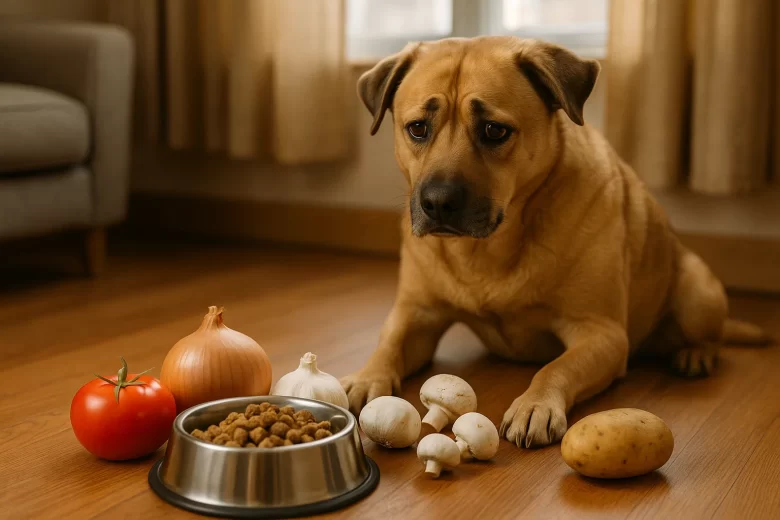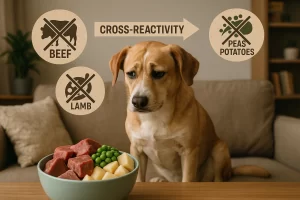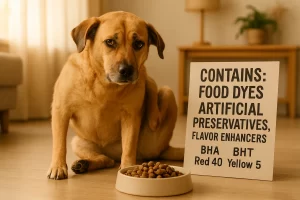As responsible pet owners, we always want the best for our dogs, especially when it comes to their health and nutrition. While vegetables are often considered a healthy addition to a dog’s diet, not all vegetables are suitable for dogs, especially those with food allergies. Some vegetables can cause allergic reactions or digestive issues in sensitive dogs. In this article, we’ll explore seven vegetables you should avoid if your dog has food allergies and provide safer alternatives to ensure their well-being.
Understanding Food Allergies in Dogs
Food allergies in dogs occur when their immune system incorrectly identifies certain food ingredients as harmful, leading to an allergic reaction. Common symptoms of food allergies in dogs include itching, gastrointestinal problems (such as vomiting or diarrhea), and skin irritations.
Vegetables can sometimes cause allergic reactions in dogs, especially if they contain compounds that trigger sensitivities. It’s important to be aware of which vegetables are safe and which ones should be avoided to maintain your dog’s health.
7 Vegetables You Should Avoid for Dogs with Food Allergies
While many vegetables are nutritious and beneficial for dogs, some may trigger allergies or discomfort. Below are seven vegetables that can cause problems for dogs with food allergies.
1. Onions
Onions, along with garlic, are part of the allium family, which is toxic to dogs. While onions are not typically known to cause allergies in dogs, they contain compounds that can lead to severe health problems. Onions can cause oxidative damage to red blood cells, leading to a condition called hemolytic anemia. Symptoms of onion toxicity include:
- Lethargy
- Vomiting
- Diarrhea
- Weakness
- Pale gums
Even small amounts of onions can be harmful to dogs, so it’s best to avoid them altogether. Additionally, onion powder or dehydrated onions found in some processed dog foods should also be avoided.
2. Garlic
Garlic, like onions, belongs to the allium family and can be toxic to dogs in large quantities. While garlic has many health benefits for humans, it contains thiosulfate, a compound that can cause oxidative damage to a dog’s red blood cells, leading to anemia. Symptoms of garlic toxicity include:
- Vomiting
- Diarrhea
- Abdominal pain
- Lethargy
Though garlic is less toxic than onions, it’s still important to avoid giving it to your dog, especially if they have food allergies. Even small amounts of garlic can trigger negative reactions.
3. Tomatoes
Tomatoes, especially when they are green or unripe, contain a toxic substance called solanine, which can cause digestive upset and other symptoms in dogs. While ripe tomatoes are generally safe for dogs in moderation, it’s important to be cautious, especially if your dog has food allergies. Dogs that are sensitive to tomatoes may experience:
- Vomiting
- Diarrhea
- Abdominal pain
- Drooling
If you do choose to give your dog tomatoes, make sure they are fully ripe, and avoid the stems and leaves, which contain higher levels of solanine.
4. Potatoes (Raw or Uncooked)
Raw potatoes, especially when they are green or sprouted, contain solanine, a toxic compound that can cause nausea, vomiting, and digestive upset in dogs. Cooking potatoes helps reduce the solanine content, but they can still be problematic for dogs with food allergies. Symptoms of potato toxicity or intolerance include:
- Vomiting
- Diarrhea
- Loss of appetite
- Stomach cramps
It’s important to avoid feeding your dog raw potatoes or the skins of cooked potatoes. If you give your dog cooked potatoes, make sure they are plain, without added butter, salt, or seasoning.
5. Corn
Corn is a common ingredient in many commercial dog foods, but it can be difficult for some dogs to digest, especially if they have food allergies or sensitivities. While corn itself is not toxic to dogs, it may cause gastrointestinal issues such as:
- Diarrhea
- Bloating
- Gas
Dogs with allergies to corn may also experience skin problems like itching or rashes. If you suspect your dog has a corn allergy, avoid feeding them corn-based foods and look for dog foods that are corn-free.
6. Brussels Sprouts
While Brussels sprouts are packed with vitamins and nutrients, they can cause digestive issues in some dogs, especially if they are eaten in large quantities. Brussels sprouts contain a high amount of fiber and can lead to:
- Gas
- Bloating
- Diarrhea
Although Brussels sprouts are not toxic to dogs, their high fiber content can be hard on your dog’s digestive system, particularly if they have sensitivities or food allergies.
7. Mushrooms
Mushrooms, both wild and cultivated, can be toxic to dogs. While not all mushrooms are harmful, many types of wild mushrooms contain toxins that can lead to poisoning. Even edible mushrooms from the store can cause allergic reactions in some dogs, such as:
- Vomiting
- Diarrhea
- Abdominal pain
- Excessive drooling
If your dog has a food allergy, it’s best to avoid mushrooms altogether, as they can cause both allergic reactions and toxicity. If you suspect your dog has ingested a wild mushroom, seek immediate veterinary attention.
Why Avoid These Vegetables?
The vegetables listed above can cause allergic reactions or digestive problems in dogs, especially those with food sensitivities. Even if your dog does not have a full-blown allergy to these vegetables, they may still experience discomfort or other health issues. Additionally, some of these vegetables, like onions, garlic, and mushrooms, are toxic to dogs and should be avoided at all costs.
If your dog has food allergies, it’s important to avoid these problematic vegetables and choose safer options. Always consult with your veterinarian if you’re unsure which foods are best for your dog, especially if they have a history of allergies or sensitivities.
Safe Vegetables for Dogs with Allergies
While some vegetables can cause problems, there are plenty of safe and healthy vegetables that can be enjoyed by dogs with food allergies. Here are some great alternatives:
- Carrots: A great low-calorie snack that promotes dental health.
- Green beans: Low in calories and high in fiber, making them perfect for dogs with food allergies.
- Sweet potatoes: Rich in vitamins and gentle on your dog’s stomach.
- Cucumber: Refreshing and hydrating, perfect for hot summer days.
- Zucchini: A great low-calorie option that’s easy on the stomach.
These vegetables are less likely to cause allergic reactions and can be a healthy addition to your dog’s diet.
Conclusion
While vegetables can be a healthy addition to your dog’s diet, it’s important to be aware of the ones that can trigger allergies or cause digestive upset. Onions, garlic, tomatoes, and certain other vegetables should be avoided, especially if your dog has food allergies. Always consult with your veterinarian to ensure that your dog’s diet is safe, balanced, and allergy-friendly.
By being mindful of the vegetables you feed your dog and choosing safe alternatives, you can help keep your furry friend healthy, happy, and free from the discomfort of food allergies.



